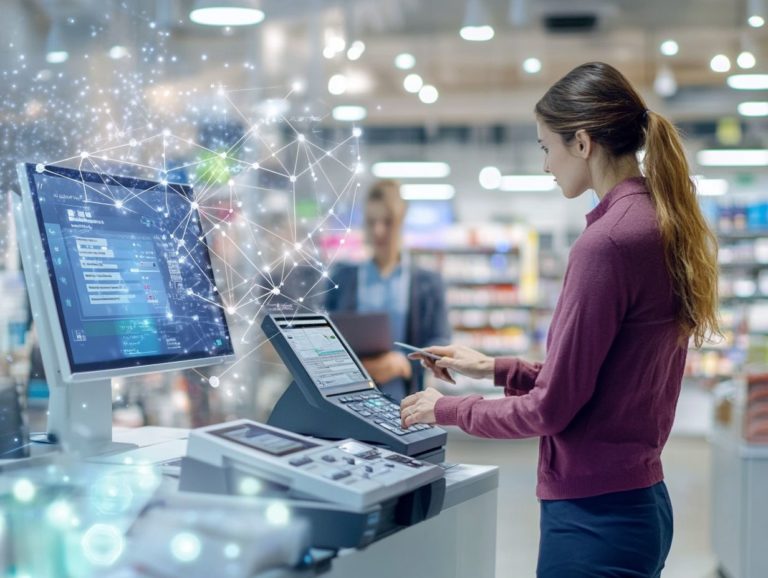60. CRM Solutions for Non-Traditional Retail
In today s rapidly changing retail landscape, non-traditional retailers face unique challenges that need innovative solutions.
This article explores the specific hurdles your business may encounter and how customer relationship management (CRM) can help you navigate them.
You will discover many benefits of CRM in improving customer experience and streamlining operations.
We ll provide practical steps for implementation and share success stories illustrating the transformative impact of CRM.
Dive in to unlock the full potential of non-traditional retail with the right strategies and tools!
Contents
- Key Takeaways:
- Understanding Non-Traditional Retail
- Benefits of Using CRM Solutions for Non-Traditional Retail
- Key Features to Look for in CRM Solutions for Non-Traditional Retail
- Implementing CRM Solutions for Non-Traditional Retail
- Success Stories of Non-Traditional Retailers Using CRM Solutions
- Frequently Asked Questions
- What is non-traditional retail?
- How can CRM solutions benefit non-traditional retail businesses?
- What features should I look for in a CRM solution for my non-traditional retail business?
- Do I need a specialized CRM solution for my non-traditional retail business?
- How can I integrate CRM solutions into my non-traditional retail business?
- Are there any CRM solutions specifically designed for non-traditional retail businesses?
Key Takeaways:

1. Non-traditional retail has unique challenges that traditional CRM solutions may not address.
2. CRM solutions can enhance customer experience and retention, streamlining operations for non-traditional retailers.
3. When choosing a CRM solution, look for customizable data management and integration with e-commerce platforms.
Understanding Non-Traditional Retail
Non-traditional retail includes various business models that differ from traditional stores, such as e-commerce, pop-up shops, and subscription services.
This sector faces distinct challenges, including rapidly changing consumer preferences and the need for effective customer relationship management.
Implementing robust CRM software is essential to improve customer service and use targeted marketing tools.
Defining Non-Traditional Retail and its Unique Challenges
Non-traditional retail includes innovative formats that offer unique challenges like fierce competition and changing consumer behavior.
These formats, including pop-up shops and online marketplaces, require distinct marketing and customer interaction strategies.
As consumers seek personalized experiences, maintaining their loyalty is essential. CRM solutions empower you to gather and analyze customer data effectively.
Using insights from data analytics, you can create tailored marketing campaigns that engage specific consumer segments and drive sales.
Benefits of Using CRM Solutions for Non-Traditional Retail
Implementing CRM solutions unlocks numerous benefits, enhancing customer experience and retention rates.
These solutions provide insights into customer behavior, streamline sales processes, and enhance communication with automated workflows.
Advanced reporting tools help you make informed decisions that drive growth and improve efficiency.
Improving Customer Experience and Retention
Improving customer experience and retention is vital for non-traditional retailers. CRM software can significantly enhance these aspects through tailored communication.
By leveraging advanced tools, you can develop personalized strategies that strengthen connections and loyalty.
Analyzing engagement metrics helps you understand customer needs and adjust offerings accordingly.
CRM solutions are essential for tracking updates and refining outreach efforts, turning ordinary transactions into extraordinary experiences.
Streamlining Operations and Increasing Efficiency

Streamlining operations and boosting efficiency are crucial for non-traditional retailers. CRM solutions offer essential tools to achieve this through automated workflows and task reminders.
By integrating these systems, you can manage sales activities with precision, ensuring that no opportunity slips through the cracks. Automatic task reminders help your team stay organized by keeping track of follow-ups, appointments, and customer interactions.
Using efficiency metrics helps you analyze sales processes, pinpoint bottlenecks, and refine your strategies for continuous improvement.
The result is that these CRM solutions transform your retail operations into a finely-tuned machine, freeing your staff to dedicate more time to crafting personalized customer experiences instead of getting bogged down by mundane administrative tasks.
Key Features to Look for in CRM Solutions for Non-Traditional Retail
When choosing CRM solutions for non-traditional retail, it’s crucial to consider key features that specifically address the unique demands of this sector, as outlined in 10 ways CRM can help retail businesses thrive.
Look for customization options, integration capabilities, and robust reporting tools. These elements not only elevate the user experience but also guarantee data security and effective management of customer relationships.
A system that offers comprehensive insights and can adapt to evolving business needs gives you the power to optimize your operations seamlessly.
Customizable Data Management and Reporting
Customizable data management and reporting capabilities are essential components of CRM software that enable you, as a non-traditional retailer, to tailor your data analysis to meet your specific business needs.
These features let you analyze engagement metrics, offering insights that shape your marketing strategies and optimize your sales activities.
By harnessing advanced analytics, you can uncover trends, track customer interactions, and evaluate the effectiveness of various campaigns.
This personalized approach improves your decision-making and helps you understand customer behavior better!
With the capability to create customized reports, you can transform raw data into compelling narratives that inform actionable strategies, ultimately leading to heightened customer satisfaction and increased revenue.
Integration with E-commerce Platforms
The ability to integrate CRM solutions with e-commerce platforms is essential for non-traditional retailers like you, enabling seamless management of your sales pipeline while enhancing the user-friendly interface.
This integration streamlines your sales processes and fosters improved engagement with customers, significantly elevating their overall experience. You can effortlessly track customer interactions, purchase history, and preferences, allowing for more personalized marketing strategies.
The outcome is a cohesive operational approach that not only boosts your sales but also cultivates loyal customer relationships.
Automate routine tasks and centralize data to allocate resources more efficiently, ensuring your teams can focus on building connections and crafting tailored offerings. Such advancements highlight the critical importance of blending CRM systems with e-commerce platforms to drive sustained growth.
Implementing CRM Solutions for Non-Traditional Retail
Implementing CRM solutions for non-traditional retail requires a smart strategy for quick and effective adoption. This involves not only comprehensive onboarding processes but also sufficient training and a keen understanding of user capacity.
By aligning CRM functionalities with the unique needs of your business, you can unlock the full potential of the system, leading to enhanced customer service and streamlined operations.
Steps to Successful Implementation

Successful implementation of CRM solutions requires you to follow a few important steps carefully. These include thorough planning, understanding onboarding fees, and providing comprehensive training to empower users to leverage the system effectively.
Effective planning lays the groundwork by identifying your specific business needs. Aligning CRM features accordingly ensures that the solution you choose supports your key operational goals seamlessly.
Next, it s vital to evaluate necessary training programs tailored to various user roles. Nurturing confidence in using the software can significantly accelerate the learning curve for your end-users.
After implementation, assessing user feedback is essential for making adjustments and improvements. This ensures that the CRM not only meets your expectations but also enhances user satisfaction and operational efficiency.
Together, these steps facilitate a smoother transition and maximize the potential of your CRM investment.
Success Stories of Non-Traditional Retailers Using CRM Solutions
Discover how non-traditional retailers transformed their businesses with CRM solutions! These success stories highlight the transformative power of these systems for enhancing customer engagement and retention.
These narratives provide valuable insights into effective strategies and practices that can elevate your business.
Real-World Examples and Results
Real-world examples of non-traditional retailers employing CRM software reveal the tangible benefits that await you. These include enhanced customer service, improved operational efficiency, and increased sales.
For instance, a well-known online furniture retailer implemented a sophisticated CRM system to meticulously track customer interactions and preferences. This strategic move enabled them to craft personalized marketing strategies, leading to an impressive 25% increase in repeat purchases within just a year.
Similarly, a health food store adeptly integrated CRM tools to manage its customer loyalty programs. By enhancing communication through tailored promotions and feedback requests, they enjoyed a 30% boost in customer satisfaction ratings.
These examples illustrate that leveraging CRM not only cultivates stronger customer relationships but also streamlines operations, ultimately contributing to a more robust bottom line for your business.
Frequently Asked Questions
What is non-traditional retail?
Non-traditional retail refers to the sale of goods and services outside of traditional brick-and-mortar stores. This can include online retailers, pop-up shops, mobile vendors, and other unconventional methods of selling products.
How can CRM solutions benefit non-traditional retail businesses?

CRM solutions can help non-traditional retail businesses by providing a central database for customer information. They streamline communication and marketing efforts while tracking customer interactions and purchasing behavior.
What features should I look for in a CRM solution for my non-traditional retail business?
Some important features to consider include customer data management, marketing automation, sales tracking, and integrations with other business tools such as e-commerce platforms and point-of-sale systems.
Do I need a specialized CRM solution for my non-traditional retail business?
While there are CRM solutions specifically designed for retail businesses, any CRM system can be customized to fit the unique needs of a non-traditional retail business. It’s important to evaluate your specific needs and choose a solution that can be tailored to meet them.
How can I integrate CRM solutions into my non-traditional retail business?
Integrating a CRM solution can be done through various methods such as API connections, third-party apps, and custom coding. Choose a CRM solution that offers easy integration options, and consult with an IT professional for assistance if needed.
Are there any CRM solutions specifically designed for non-traditional retail businesses?
Many CRM (Customer Relationship Management) solutions are tailored for non-traditional retail businesses. These solutions offer features like mobile capabilities, pop-up shop support, and flexible pricing, making them essential for gaining customer insights in retail.
They also work well with popular online shopping sites. Get ready to transform your retail experience with options like Vend, Square, and Lightspeed!






